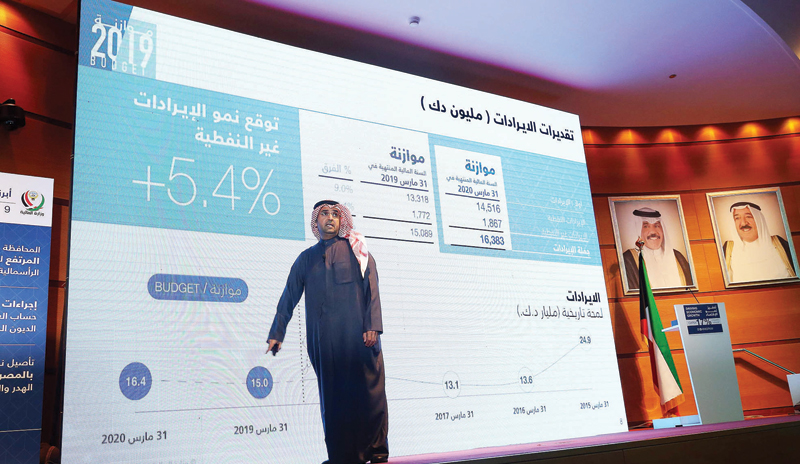Hajraf vows fiscal reforms - Oil seen at $55 per barrel - Non-oil revenues to increase

KUWAIT: Kuwait's estimated budget deficit for the 2019/2020 fiscal year could soar to KD 7.7 billion ($25.3 billion), Finance Minister Nayef Al-Hajraf said yesterday. Kuwait plans to spend KD 22.5 billion ($74 billion) in total expenditure for the fiscal year 2019/2020 - a 4.7 percent rise - based on an average of $55 per barrel of Kuwaiti crude oil, the minister told a press conference held at the Public Institution for Social Security.
Total revenues stand at KD 16.4 billion ($54 billion), KD 14.5 billion ($47.7 billion) of which are oil revenues, while non-oil revenues amount to KD 1.86 billion ($6.1 billion), 5.4 percent higher compared to the current year's budget. Hajraf revealed wages and employee bonuses make up 71 percent of total expenditure, while capital spending accounts for 17 percent, with 12 percent forming other expenses. The budget projects state subsidies of KD 3.97 billion.
Hajraf said the estimated budget deficit of KD 7.7 billion takes into account revenue deductions of 10 percent earmarked for the Future Generations Fund, which is managed by the Kuwait Investment Authority (KIA). KIA, a major global investor, manages about $592 billion in assets, according to the Sovereign Wealth Fund Institute, which ranks it the world's fourth-biggest sovereign wealth fund.
The finance ministry said the fiscal deficit is expected to decline by 2.1 percent compared to current budget figures. Hajraf said the deficit will be totally covered by general state reserves. The 2019-2020 budget indicates a breakeven oil price range of $75 to $80 per barrel, based on an average daily oil output of 2.8 million barrels. Brent crude oil futures traded around $63 yesterday. "We should not depend completely on the rising price of oil, but decrease expenses. Oil expenses also increased due to spending on oil refining and development," Hajraf said.
The budget has been designed to stimulate economic growth through maintaining capital expenditure levels of 17 percent, Hajraf pointed out, suggesting a correlation between the completion of development projects and cutting unnecessary expenses. "We are firmly on the path towards fiscal reforms," he emphasized, citing stricter measures dealing with government debt collection, including a settlement of KD 341.4 million ($1.1 billion) for the next fiscal year.
"This starts with cutting unnecessary expenses. Public institutions should all cooperate to reduce expenses," explained Hajraf. "We also will cooperate with the parliament to pass a new law on the rules of preparing the state budget. This will cause a boom in accounting systems, which will result in more precise financial expectations, actual performance and transparent results," he pointed out.
By Nawara Fattahova and Agencies










